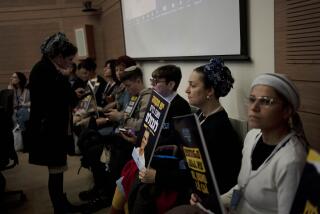Hostages’ Relatives, Jackson Meet With Officials
- Share via
WASHINGTON — Civil rights leader Jesse Jackson and relatives of four U.S. hostages held by Islamic radicals in Lebanon met Friday with U.S. and Arab officials here but received little more than encouragement in their effort to secure the hostages’ freedom.
The group urged that the United States actively seek the freedom of the kidnap victims, who are believed to be held in Syrian-controlled territory in eastern Lebanon by Islamic Jihad, one of the organizations suspected of the suicide bombings of the U.S. Marine barracks and U.S. Embassy compound in Beirut in 1983.
Islamic Jihad has demanded the freedom of its members imprisoned for similar bombings in Kuwait, and Jackson and some of the hostage relatives said they would go to Kuwait to plead for an exchange. They also offered to fly to Tehran to seek the intervention of Iran, the nation with the most influence over Islamic Jihad.
Jackson made a controversial trip to the Middle East in 1983 to win the release of a U.S. Navy aviator shot down in Lebanon. He made a 15-minute call on the Kuwaiti ambassador, Sheik Salud Nasir al-Sabah, Friday afternoon. After the visit, an embassy spokesman said Jackson had not asked for a visa.
Asked if the Kuwaitis gave Jackson any indication of a change in their country’s intention to hold 17 Islamic Jihad members until they have completed their sentences as participants in bombing attacks against the U.S. and French embassies in Kuwait two years ago, the spokesman said: “The position of the government is final. It won’t be changed.”
Earlier, Jackson and a dozen of the relatives conferred for the second consecutive day with Robert Oakley, director of the State Department’s office of counterterrorism.
U.S. Willing to Talk
Oakley made no comment after Friday’s meeting. But State Department spokesman Bernard Kalb said that, although it is “longstanding U.S. policy not to give in to attempts by terrorist groups to obtain the release of their colleagues,” the United States remains willing to talk with the kidnapers.
“There must be a willing interlocutor,” Kalb cautioned. “To date, there has not been one.”
After meeting with Oakley, Jackson and the family representatives went to the Washington headquarters of the League of Arab States to meet with Clovis Maksoud, who represents the league at the United Nations. Maksoud, a Lebanese, later said in a statement, “We are eager that the issue be resolved in a manner that is satisfactory to all and that the causes of this particular situation be addressed and redressed.” Peggy Say, sister of hostage Terry A. Anderson, kidnaped chief Middle Eastern correspondent for the Associated Press, told reporters after the meeting with Maksoud, “I’m concerned with getting my brother home, and whatever is necessary to do I’ll do.”
Jackson, who later returned to his home in Chicago with some of the hostage relatives, is expected to return to Washington on Monday for meetings with Sen. Paul Simon (D-Ill.) and other senators from the hostages’ home states.
More to Read
Sign up for Essential California
The most important California stories and recommendations in your inbox every morning.
You may occasionally receive promotional content from the Los Angeles Times.










